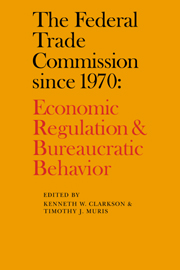Book contents
- Frontmatter
- Contents
- List of contributors
- Preface
- 1 Introduction
- Part I The institutional setting
- Part II Nature and consequence of FTC actions
- Introduction
- 6 Bureau of Competition: antitrust enforcement activities
- 7 Information for antitrust and business activity: line-of-business reporting
- 8 Industry structure investigations: Xerox's multiple patents and competition
- 9 Exclusionary practices: shopping center restrictive covenants
- 10 Legislative powers: FTC rule making
- 11 Rewriting consumer contracts: creditors' remedies
- 12 Regulating postpurchase relations: mobile homes
- 13 Regulating information: advertising overview
- 14 Special statutes: the structure and operation of the Magnuson-Moss Warranty Act
- Part III Conclusions and reforms
- Notes
- Selected bibliography
- Index
7 - Information for antitrust and business activity: line-of-business reporting
Published online by Cambridge University Press: 05 November 2011
- Frontmatter
- Contents
- List of contributors
- Preface
- 1 Introduction
- Part I The institutional setting
- Part II Nature and consequence of FTC actions
- Introduction
- 6 Bureau of Competition: antitrust enforcement activities
- 7 Information for antitrust and business activity: line-of-business reporting
- 8 Industry structure investigations: Xerox's multiple patents and competition
- 9 Exclusionary practices: shopping center restrictive covenants
- 10 Legislative powers: FTC rule making
- 11 Rewriting consumer contracts: creditors' remedies
- 12 Regulating postpurchase relations: mobile homes
- 13 Regulating information: advertising overview
- 14 Special statutes: the structure and operation of the Magnuson-Moss Warranty Act
- Part III Conclusions and reforms
- Notes
- Selected bibliography
- Index
Summary
Among the items on the agenda of the “new” Federal Trade Commission, the agency's line-of-business program must rank as one of the most controversial. Line-of-business has prompted lawsuits by literally dozens of the nation's largest corporations, raised fundamental questions about the relationship between economic analysis and accounting and stirred controversy within branches of the federal government. It bears the potential for changing the direction of antitrust enforcement.
The dispute over the line-of-business program (hereafter LB) may seem at first glance surprising. After all, the gathering of information and its dissemination has long been one of the chief justifications for the existence of the Federal Trade Commission (hereafter FTC or Commission). Woodrow Wilson, in his recommendation for the creation of the FTC, saw the new commission “as an indispensable instrument of information and publicity, as a clearing house for the facts by which both the public mind and the managers of great business undertakings should be guided.” What the Commission seeks to gather is information on the financial performance of the nation's largest corporations by separate product lines or subdivisions. Some 274 lines of business have been delineated for monitoring. According to the FTC, the figures on sales, assets, costs, and profits submitted to it will be aggregated by individual lines of business and published in such a way that the financial statistics from any one company will be obscured. The stimulus for LB is the diversified nature of many large corporations.
- Type
- Chapter
- Information
- The Federal Trade Commission since 1970Economic Regulation and Bureaucratic Behavior, pp. 98 - 120Publisher: Cambridge University PressPrint publication year: 1981



